Influencer Communication for Youth Health
(INCO)
In this project, young people work closely with researchers to develop ideas for social media campaigns for health promotion. They share their experiences and design first concepts. Selected campaigns are tested in experimental studies, evaluated, and thoroughly discussed with the participants.
What are the aims of the project?
The project aims to develop new ideas for health promotion on social media together with young people. Students are not only asked for their opinions but actively shape the research process. In workshops, they discuss how influencers can present health topics in engaging ways and create their own campaign proposals. The most convincing ideas are tested in scientific online studies to examine their impact. Afterwards, the results are reflected on together with the students and presented publicly. This creates an innovative approach that raises awareness of health promotion among young people, values their perspectives, and delivers practical, evidence-based communication strategies that can be directly applied in real campaigns.
How can I participate in the research?
In line with the citizen science approach, young people can actively experience and help shape the entire research process: - Participation in school classes: Three selected classes take part in developing campaigns for youth health promotion. - Contributing ideas: Young people share their experiences, discuss relevant health topics, and develop initial concepts for influencer campaigns. - Workshops: In creative and design-thinking workshops, concrete social media campaigns are developed. - Competition & selection: The best ideas are evaluated and selected by the classes. - Online studies: Selected campaigns are tested in an online experiment with around 1,500 participants. - Reflection: Results are reflected upon together with the young people. - Contribution to results: Young people provide feedback, support scientific publications, and contribute their perspectives to the further development of the project.
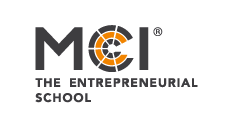
HealthCheckR
Identifying trustworthy health information on social media
In the HealthCheckR project, we are working with citizens to create a simple tool that helps people find trustworthy health information on social media. This will help stop false information and support better health decisions.
What are the goals of the project?
The goal of the project is to develop an easy-to-understand and tested tool together with citizens that helps identify whether health information on social media is trustworthy.
How can you contribute to the project?
You can contribute to our project in different ways – we’re happy to have you on board! Here’s how you can take part:
- Share your opinion & help shape the tool as a citizen scientist, you can:
- take part in workshops or surveys,
- give feedback on early versions of the tool,
- tell us what works well and what needs improvement.
- Test our tool
- You can try out the prototype and let us know how easy it is to use, how clear the content is, and whether it meets your needs.
- Help spread the word
- If you like, you can support us in sharing the final tool – for example, via your social media channels or in conversations with others.
How to join the project
We’ll soon publish all relevant information about how to participate, including key dates and contact details, on our project website and through our social media channels. Or just send us an email.
The main roles and responsibilities are:
Citizen Scientists as members of the Project Steering Group (PSG):
In this role, they share their experiences as users of social media. Together with experts, they help make important decisions about the project. For example:
- choosing a project name and logo,
- planning the co-research workshops,
- discussing the results of the literature review,
- helping to invite more Citizen Scientists,
- deciding how the tool should look and work,
- contributing to the communication strategy,
- helping to share the project results – and more.
Citizen Scientists as co-researchers:
They support the research team in understanding findings from other studies – especially from the perspective of people who use social media to find health information.
They help check which findings are relevant in Austria and help write the evaluation criteria in a clear and easy-to-understand way.
Citizen Scientists as co-designers:
The main outcome of the project is a tool that helps people check the reliability of health information on social media. This tool is developed together with Citizen Scientists in co-design workshops.
They also help plan how to share the tool – for example on social media or at events – so that it reaches as many people as possible.
There are also several roles within the research team:
These include:
- project management,
- contribution to the literature review,
- organizing and moderating workshops,
- communication with experts and the public.
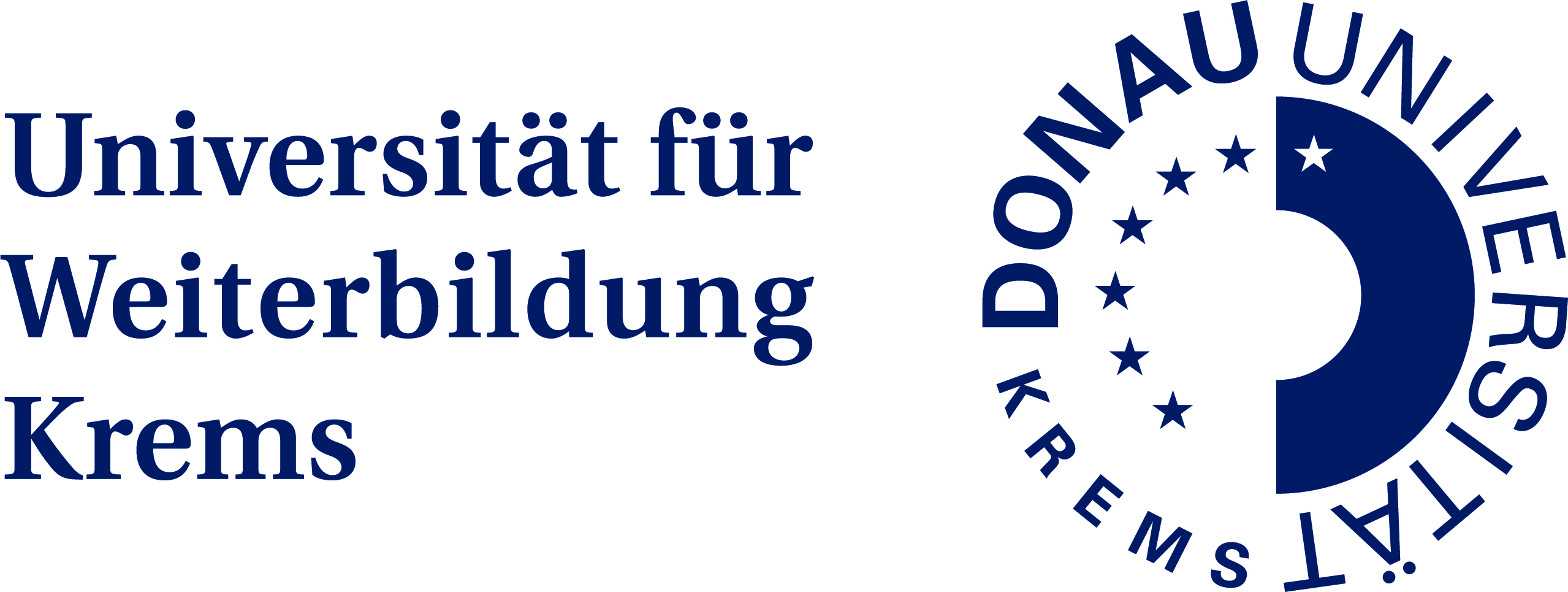
Environmental distribution of bisphenol A
The project “Environmental distribution of bisphenol A” investigates the possible spread of bisphenol A (BPA) in our environment. To this end, citizen scientists collect samples (soil, sludge, water, etc.) and send them to our laboratory, where the BPA concentration in the samples is determined.
What are the aims of the project?
Via a public sampling approach, any kind of sample that possibly contains BPA is sent to the lab and BPA concentrations are determined. The team of the project aims at creating a map of the different sample locations with respective BPA concentrations. Detailed data on BPA concentration of each single samples will be made available to every citizen scientist.
How can you participate in research?
Please send us any type of sample (soil, sediment, water, etc.). You can request a sampling kit free of charge on our project page. There you will find instructions on how to take samples. We will test the sample for possible BPA concentrations and send you the results by email. You will be helping us to create a map showing BPA concentrations.
COwWEL
A OneWelfare approach studying food vulnerability.
The project "COwWEL" examines, together with citizen scientists from socio-economically disadvantaged groups, conditions that promote or hinder healthy and sustainable consumption behaviour in these groups, taking into account attitudes toward animals and their welfare. The goal is to develop strategies and information material to promote fairer and more sustainable food systems.
What are the aims of the project?
- Evaluation of conditions that promote or hinder the establishment of healthy and sustainable eating practices for vulnerable groups
- Investigation of the role of concepts of human-animal relationships and the welfare of humans and animals (One Welfare).
- Development of individual and political strategies to promote healthy and sustainable food consumption and creation of supporting materials.
- Contribution to the development of healthier, more inclusive, and sustainable food systems through integration into the main project COwLEARNING.
How can you participate in research?
The target group consists of citizens from three vulnerable groups: Syrians or other people of Arab descent, Ukrainians, and Austrians who have received food from food banks in the last five years. In an initial workshop, hypotheses will be developed together, forming the basis for the creation of a questionnaire. After the questionnaire is created, reviewed, and the citizen scientists are trained in interviewing, data collection will take place (i.e., interviewing individuals from the respective vulnerable groups). Following data analysis by the scientific team, individual, societal, and political strategies for sustainable food consumption in vulnerable groups will be developed in a second workshop together with institutions.
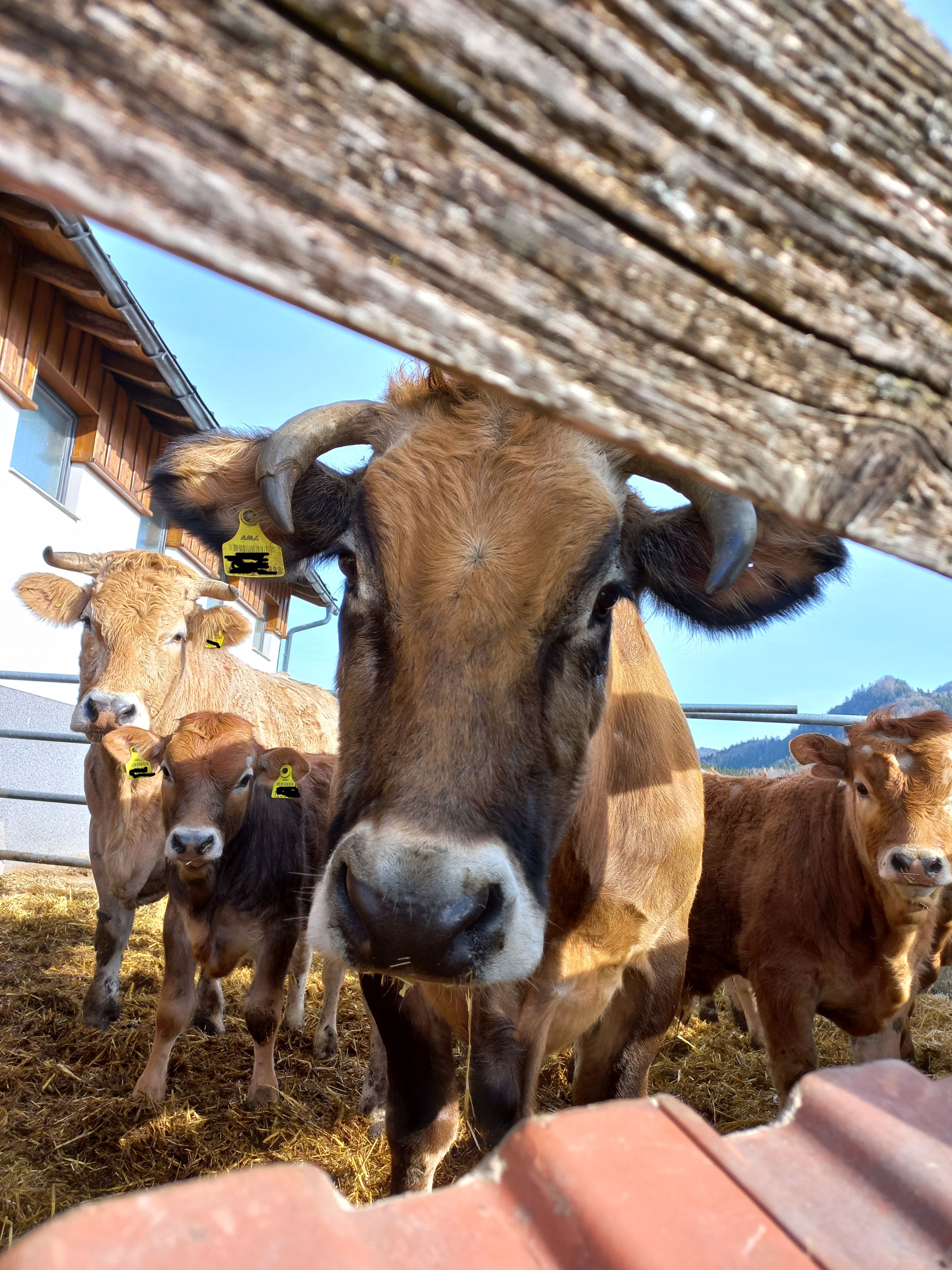
ACCESS
Smart Movement Analysis for Knee Osteoarthritis
ACCESS investigates how knee osteoarthritis affects movement — directly in physiotherapy practices using modern 3D movement-analysis technology. Patients and physiotherapists collaborate with researchers to gain new insights for better treatment.
What are the aims of the project?
ACCESS investigates how knee osteoarthritis affects everyday movement. The goal is to capture movement patterns of patients using innovative 3D motion analysis — directly in physiotherapy practices. Together with physiotherapists, both movement data and information on pain, function, and quality of life are collected. This leads to new scientific insights into how osteoarthritis affects mobility and how therapies can be better tailored. By participating, citizens contribute valuable data to research while gaining insights into modern movement technology and their own health.
How can you participate in research?
You can join ACCESS either as a physiotherapist or as a patient with knee osteoarthritis. Physiotherapists collect movement data using two smartphone cameras to analyze functional tests (Walking, Sit-to-Stand, stair climbing) and health information. Patients voluntarily take part in the 3D motion analysis and complete questionnaires on pain, function, and quality of life. Both groups receive clear instructions and are actively involved in the research — hands-on, anonymous, and directly integrated into everyday therapy.
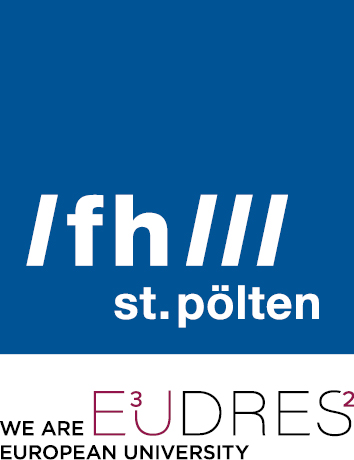

Young Citizen Science PolliDiversity
In the PolliDiversity project, students explore flowering areas and observe pollinating insects like wild bees. Using digital tools, they collect scientific data and learn how to protect and experience biodiversity.
What are the aims of the project?
In the PolliDiversity project, students investigate the development of flowering areas using the ReNatura® BW3 Gumpenstein wildflower mixture, observe wild bees and other pollinators, and collect scientific data using digital tools. The goal is to raise young people's awareness of the importance of biodiversity and actively involve them in scientific research. The project is accompanied by a biology education study conducted by the Paris Lodron University of Salzburg, which examines how students’ well-being, emotions, environmental awareness, ecological understanding, species knowledge, and connection to nature change through participation. Additionally, the impact of mindfulness is being explored in a comparison group.
How can you participate in research?
Interested schools can register as project partners and participate with their classes. Students create flowering areas, observe pollinators, and document their findings using digital tools and standardized protocols. They are supported by teaching materials, explainer videos, and booklets. Individuals can also engage by accessing the project’s digital platforms, sharing experiences, and supporting the initiative. All relevant information on how to participate is available on the project website and in the project brochure.
-
 Students planting the flowering area Students planting the flowering area
Students planting the flowering area Students planting the flowering area -
 Students identifying the plants Students identifying the plants
Students identifying the plants Students identifying the plants -
 red mason bee (Osmia bicornis) red mason bee (Osmia bicornis)
red mason bee (Osmia bicornis) red mason bee (Osmia bicornis)
https://www.citizen-science.at/en/component/k2/tag/health#sigProId5b5de21b2a

Phänologie - Naturkalender - Phenowatch
Since 1851, we have been researching the changes in weather, climate and nature and what this means for us humans by observing plants and animals. These phenological observations help, for example, in climate research, agriculture and pollen forecasting in order to better deal with climate change.
What are the aims of the project?
Plants act as an integrating measuring instrument for a variety of environmental factors such as weather conditions in the past and current vegetation year. If one analyzes the temporal course of phenological observation data, the influencing factor of air temperature becomes clear, especially in the spring phases in Austria, both in short-term fluctuations and in long-lasting trends. Phenology is therefore an ideal bio-indicator for gradual changes in the climate. Research objectives include
- Climate monitoring in addition to instrumental measurements.
- Temperature sensitivity of phenological events - Does the sensitivity of plants change with the temporal shift of phenological phases?
- Groundtruthing of vegetation indices from satellite observations.
- Further basic plant physiological research - future phenological modeling on an even more plant process-oriented basis.
How can you participate in research?
Find your favorite trees and shrubs in your favorite location and observe and document their development from bud burst and the start of flowering to fruit ripening, leaf coloration and leaf fall through the ten phenological seasons. We are looking for the date for the start of the respective development phases of the so-called indicator plants. You can send this to us in the "Nature Calendar" app with a photo or in the traditional way using a paper form. You can find all the information you need on our website.
-
 Important indicator plants Important indicator plants
Important indicator plants Important indicator plants -
 Snowdrop blossom Snowdrop blossom
Snowdrop blossom Snowdrop blossom -
 Black elderberry Black elderberry
Black elderberry Black elderberry
https://www.citizen-science.at/en/component/k2/tag/health#sigProId2b82b6fefd
Podcast episode
In May 2025, Thomas Hübner (GeoSphere Austria) and Maximilian Bastl (Pollenservice of MedUni Wien) reported on phenological research in our Österreich forscht podcast Wissen macht Leute - you can listen to the episode here (in German).
This project fulfils version 1.1 of the quality criteria for citizen science projects on Österreich forscht.
Healthy Minds
Mental Health around Childbirth
This project focuses on the mental health of parents around childbirth, aiming to detect issues early and provide better support. The goal is to promote the emotional well-being of parents and infants and improve access to support services in Tyrol.
What are the aims of the project?
The Healthy Minds project aims to promote parents' mental health during pregnancy and early parenthood and close existing gaps in care. The focus is on improving the early detection of mental illness and access to suitable support services in Tyrol, particularly in regions with limited resources. The aim is to offer those affected support at an early stage, reduce stigma and raise awareness of perinatal mental health. Through workshops, an awareness campaign and new, needs-based support services, the aim is to promote open dialog and deepen understanding of the challenges of parenthood. The project is based on a participatory approach that actively involves parents in the development and design of interventions in order to create culturally appropriate and effective solutions for affected families in the long term.
How can you participate in research?
Interested citizens can actively participate in the Healthy Minds project and strengthen the mental health of parents in Tyrol by taking part in workshops, focus groups and interviews, contributing their personal experiences and perspectives and thus helping to shape the development of new support services. The evaluation of measures, such as the awareness campaign, also offers the opportunity to directly influence the project. In addition, people can participate in the so-called competence group, which consists of people with lived experience and advises our research activities at irregular intervals. Participation in all our activities can take place both online and offline. Regular updates and opportunities for participation are communicated via newsletters and social media. The aim is to promote close collaboration between citizens and researchers in order to develop practical and culturally appropriate solutions for affected families. Participation is designed to be easily accessible to all interested parties, even without prior knowledge. Every voice counts to create a better understanding of the challenges faced by new parents.
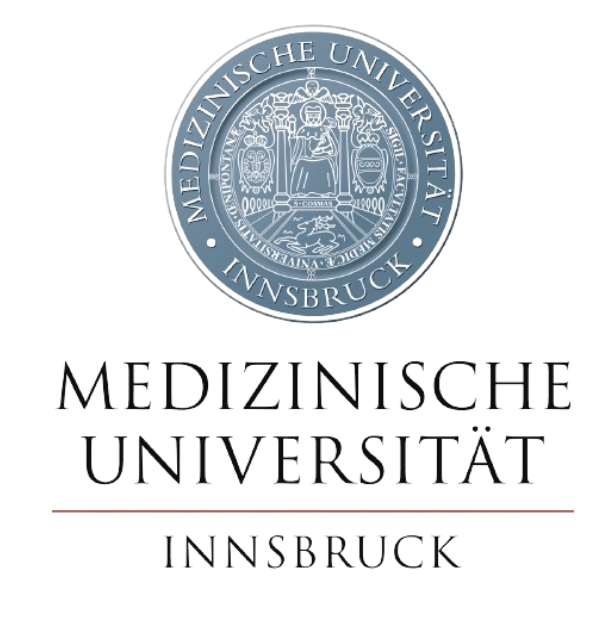
This project fulfils version 1.1 of the quality criteria for citizen science projects on Österreich forscht.
Bug us with your ticks!
For our national tick monitoring programme, we invite you to provide us with ticks. Your samples will help us analyse which tick species appear when and where in Austria. Moreover, ticks will also be investigated for the presence of pathogens.
What are the aims of the project?
The goal of our national tick monitoring programme is to obtain data regarding tick species in Austria, their occurrence, and the pathogens they may carry. The objective is to sample ticks from a wide variety of regions, regardless of whether they are sourced from vegetation or hosts. The collection of ticks is mainly conducted by citizen scientists, whose participation is essential for the success of such an initiative. The collected data can assist in identifying hot spots for specific pathogens, discover new or lesser-known microorganisms, and learn about the occurrence of native tick species but also the spread of invasive ones such as Hyalomma. A continuous monitoring is of importance particularly in light of climate change which can strongly impact the tick fauna. The insights gained from this programme can enhance overall health by facilitating earlier detection of tick-borne diseases and thereby allowing for timely and appropriate treatment.
How can you participate in research?
As soon as you encounter a tick you can join the project if following pre-requisites are fulfilled:
- Tick still intact (i.e. not squeezed out or badly damaged)
- Data available for:
- Date of tick discovery or removal from host
- Postal code and location
- Host information (if tick was removed from a host – which one?)
Ticks have to be securely packaged (e.g. by adhesive tape on a piece of paper inside a properly closed envelope) before being either dropped off at an AGES location or being sent to Vienna:
AGES GmbH
Department for Vector-borne diseases - Ticks
Währinger Straße 25a
1090 Vienna
We would like to point out that the legal regulations for the transportation of dangerous goods by mail must be observed. Live ticks can only be dropped off at the listed drop-off locations.
Further details can be found on our homepage in the section “Found a tick?”. If you suspect to have found a Hyalomma tick (“giant tick”) without the possibility to submit the tick to us please send a photo to This email address is being protected from spambots. You need JavaScript enabled to view it. Thank you!
Background informationen
So far 19 native tick species have been described in Austria. The most common ones belong to the genera Ixodes (e.g. I. ricinus), Dermacentor (e.g. D. reticulatus) and Haemaphysalis (e.g. Ha. concinna). These hard ticks have a lifecycle which comprises of three life stages (larva, nymph, adult). Between each life stage, and before a female adult tick can lay eggs, a blood meal must take place.
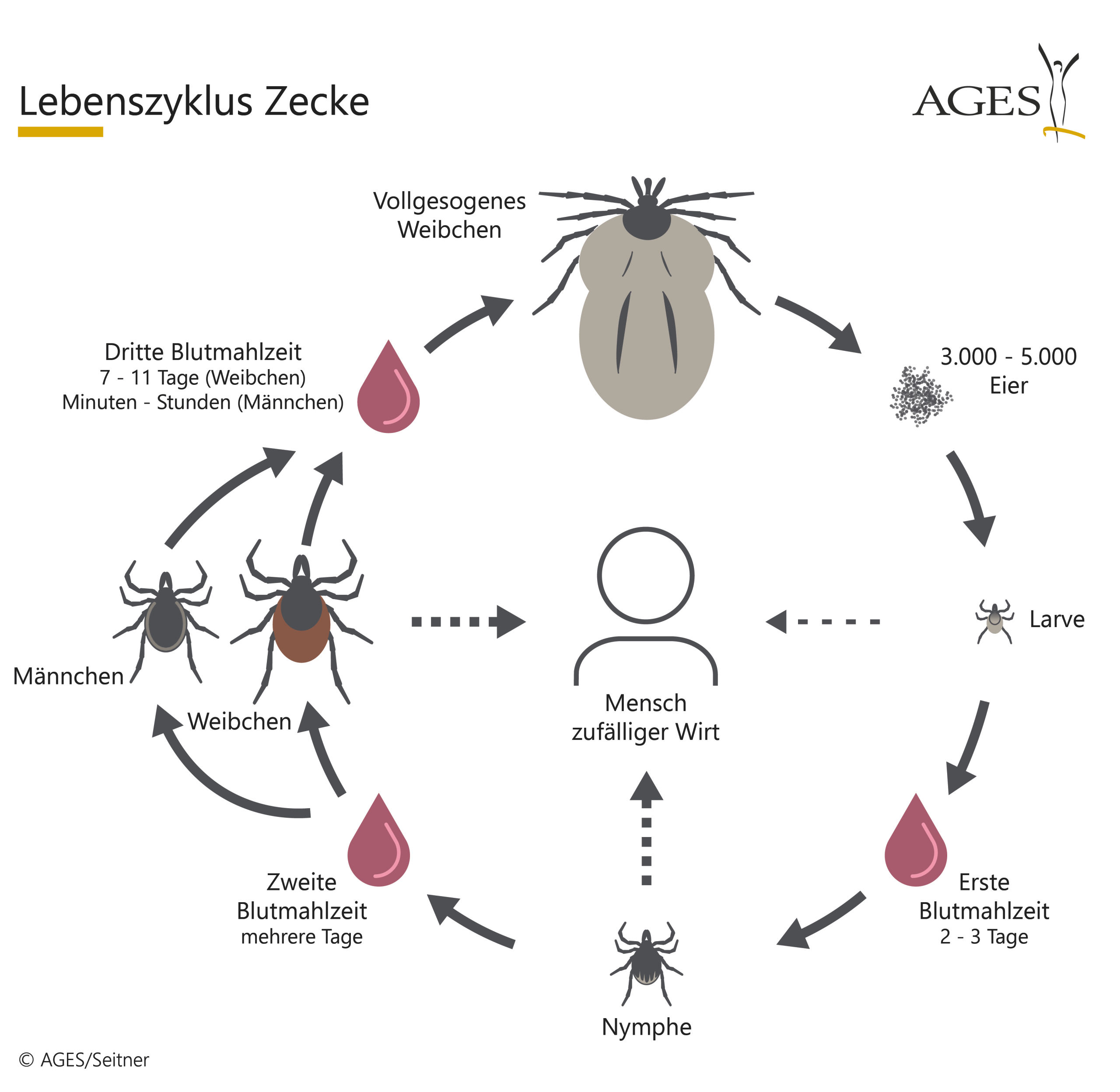
Most pathogens are taken up from reservoir animals during those blood meals (e.g. small rodents, birds, etc.) and can be transmitted from the tick at the next blood meal. The most common pathogen found in ticks in Europe are bacteria of the genus Borrelia which are the causative agent of Lyme borreliosis. However, there are many other tick-borne pathogens which can cause diseases in humans and animals (e.g. Rickettsia, Anaplasma, Neoehrlichia, etc.).
Aside from native ticks the so-called ‘giant ticks’ are increasingly appearing in the media.
They are identifiable by their typical yellow stripes along their legs when compared to native ticks. These ticks are usually imported to Austria from warmer regions. Due to climate change an expansion into more northern regions can be expected. Hyalomma ticks can transmit more harmful pathogens (such as Crimean-Congo haemorrhagic fever virus or Rickettsia aeschlimannii) hence, monitoring the spread of this vector is of medical importance. However, this is only possible by reports from well informed citizens. Thanks to citizen scientists we were able to uncover a previously unrecognized way of migration for these ticks: rather than migratory birds, it was tourists who were responsible for a significant number of introductions of Hyalomma ticks to Austria.
To be able to monitor the tick fauna of Austria for health relevant changes (i.e. expansion of dangerous vectors, emergence and spread of (new) pathogens) a national tick surveillance programme was started beginning of 2024 as part of an EU-project (OH SURVector, EU-Project Nr. 101132974). The acquisition of another project allows for continuation of the implemented surveillance activities until end of 2028.
The mission of AGES is to supply citizens with information. For that reason, a homepage is available which features interesting content about ticks and tick-borne diseases. Moreover, detail information about the ongoing surveillance study and its results are provided.
Role descriptions
Within this project four main tasks are executed:
- Tick collecting
- This step is planned to be carried out by citizen scientists. Participation is open to anyone who finds a tick and sends it to AGES where further processing will take place. It is crucial that submitted ticks are intact and the necessary information regarding date, location and hosts is provided.
- Morphological tick identification
- Tick experts will analyse morphological features of the tick under a microscope to determine the tick species. During that, samples are entered into an internal database, and it is decided whether a tick sample is eligible for further analysis. Strongly damaged ticks will not be processed further than this step.
- Molecular screening for pathogens
- In the next step trained laboratory personnel will extract the nucleic acids (RNA and DNA) of the tick sample and perform molecular methods (e.g. PCR) for detection of tick-borne pathogens. The results are then entered into the internal database.
- Results and communication
- The results of the molecular screening and morphological analysis are summarized. A team of tick experts, data experts and communication experts work together in this step to create maps, submit data to international databases, update the homepage or prepare newsletters. Occasionally information may be disclosed to the media.
Podcast episode
Anna Schötta, Georg Duscher and Mateusz Markowicz share their insights into the practice of tick research on the Österreich forscht podcast Wissen macht Leute - you can listen to the episode from July 2025 here (in German).
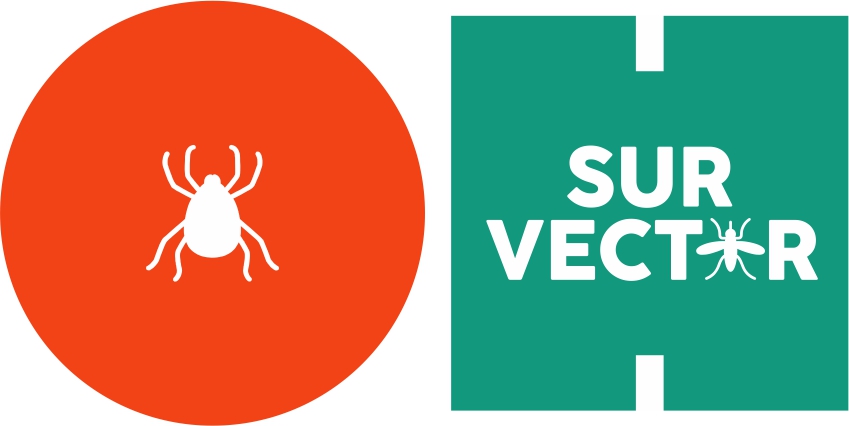

This project fulfils version 1.1 of the quality criteria for citizen science projects on Österreich forscht.
Village
How to raise the village to raise the child
The Village Project supports children and adolescents of parents with mental health issues by strengthening their formal and informal support networks. The aim is to evaluate the effectiveness of the Village approach and integrate it sustainably into existing structures.
What are the aims of the project?
The "Village" project aims to improve support for children of parents with mental health issues in Tyrol. It investigates how affected families can be better supported by developing and testing tailored intervention programs. The project focuses on collaborating with local stakeholders and involving the families directly. Together, solutions are created that address the specific needs of the region. By engaging families and professionals, a sustainable support network is built, ultimately improving the quality of life for both children and their parents in the long term.
How can you participate in research?
Interested citizens could participate in the "Village" project by contributing as local stakeholders or people with lived experience. They took part in workshops where solutions were co-created and shared their experiences to help shape the interventions. They also participated in interviews and surveys that contributed to evaluating the effectiveness of the developed programs. Their perspectives and needs were essential in the research process to ensure that the support measures developed were well-suited to the realities of affected families.
Video about the project
This project fulfils version 1.1 of the quality criteria for citizen science projects on Österreich forscht.



